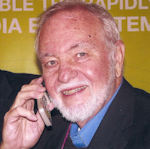This article is part of the Professional Advancement Series: Massive Open Online Content Resources
The Communications Society (ComSoc) of the Institute of Electrical and Electronic Engineers (IEEE) offers a professional certification on wireless technologies crafted to test and validate your wireless knowledge. It’s also designed to assure employers that you have a certain minimum understanding of wireless technology. Called the Wireless Communications Engineering Technologies (WCET) certification, it involves one of the most advanced and comprehensive evaluations of wireless knowledge.
The IEEE provides materials to prepare for certification, including A Guide to the Wireless Engineering Body of Knowledge (WEBOK). Also available is an online practice exam as well as the five-day online Virtual Intensive Course on Wireless Communications Engineering, a comprehensive course that I recently completed. These sessions use a lecture/Power Point format over a GoTo Meeting link that runs two hours in the morning and two hours in the afternoon.
The course is divided into the seven parts that mesh with the WCET exam topics: RF Engineering, Propagation, and Antennas; Wireless Access Technologies; Network and Service Architectures; Network Management and Security; Infrastructure and Wireless Communications; Agreements, Standards, Policies, and Regulations; and Wireless Communication: Concepts and Course Review.
The course makes one appreciate the scope and complexity of wireless communications. It is definitely not for beginners. I fault the IEEE for not making the prerequisites clear, as I fear some novices might find themselves baffled during some parts. Throughout the course, there’s an emphasis on the cellular radio networks and minimal focus on short-range wireless LAN/PAN.
Here’s my feedback for the organizers and presenters: Not all of us already know everything you do, and I recommend you devote more time to definitions and acronyms.
The course comes with the WEBOK text. Although I haven’t taken the practice exam, I suspect that it’s essential. I haven’t decided whether I am going to attempt the exam. I am certainly at the expert level in some topic areas, but weak in others. (I suspect many of you are at a similar level.)
For example, it’s hard to be an RF/circuit/antenna expert as well as an expert in network topology, management, and administration. I asked the IEEE about this matter, but the organization insists that you’re not a wireless expert unless you know it all. That may keep many of you from attempting this valuable credential. If you are interested in a goal that will encourage you to learn more and become more professional, consider the WCET.
Congratulations to IEEE and the ComSoc for an excellent course and certification. For more details on the certification itself and the courses, go to www.ieee-wcet.org and www.comsoc.org/IEEECertification.
This article is part of the Professional Advancement Series: Massive Open Online Content Resources

